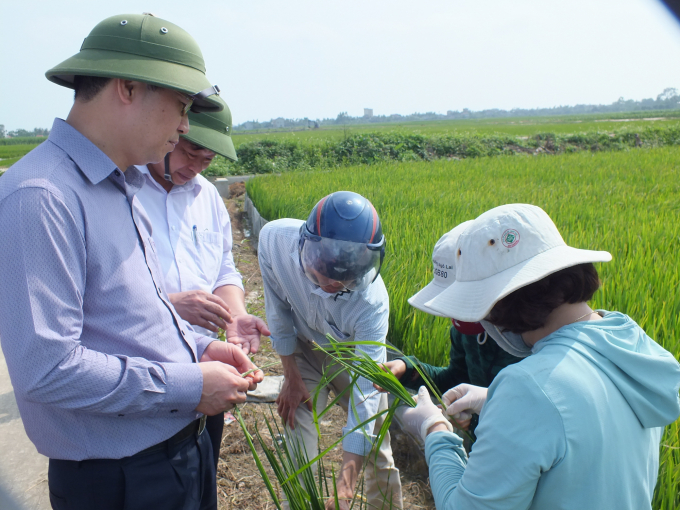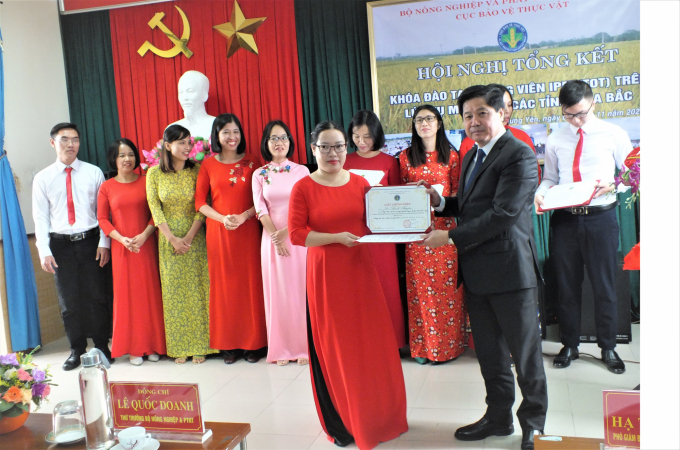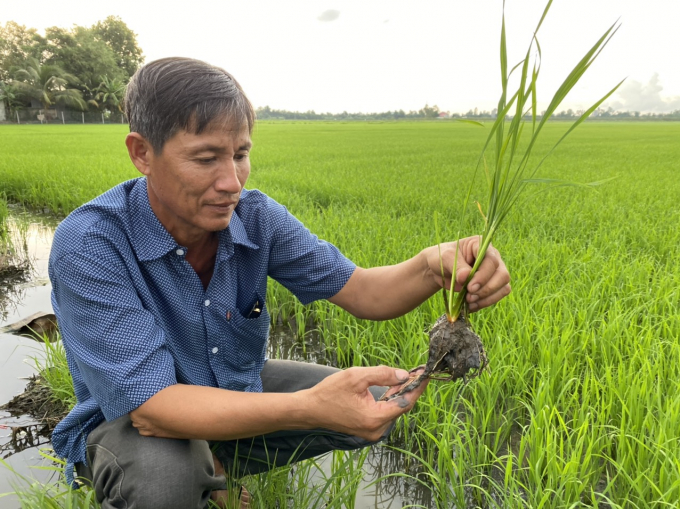- Giới thiệu
- Nhóm Công tác
- Tin tức
- Thông tin về FTA
- Tài Liệu
- Sự kiện
- Liên hệ
- The People's Committees of provinces and cities under the Central instruct DARD to lead and coordinate with relevant departments to develop programs and plans to deploy IPM on key crops with economic value and export potential, especially in new rural communes, communes with large fields for production, linked models, and submit them to the Provincial People's Committee for approval.
- Arranging and guiding the use of local budgets, integrating IPM into programs and projects implemented in the locality (new rural program, agricultural extension projects ...), mobilizing social capital, public-private partnership (PPP) to create resources to promote IPM development on a large scale.
New impetus to spread the IPM Program
The Ministry of Agriculture and Rural Development has instructed to continue the implementation of the Integrated Pest Management Program (IPM) on key crops with high economic value and export potential.
On November 24, 2020, the Ministry of Agriculture and Rural Development issued Directive No. 8141 / CT-BNN-BVTV to the People's Committees of provinces, cities and affiliated units to continue implementing the integrated pest management (IPM) program on key crops with high economic value and export potential
IPM helps Vietnam's agriculture improve significantly the efficiency and sustainability
According to the Ministry of Agriculture and Rural Development, the integrated pest management (IPM) program has been widely accepted in many countries around the world.
Since 1992, the United Nations Food and Agriculture Organization (FAO) has introduced IPM to Vietnam, supported the training of IPM trainers (TOT) and farmers through farmer field school (FFS); The IPM program has been applied on rice, cotton, vegetables and fruit trees... in our country.

The measures applied in IPM are also the basis for the development of technical advances such as “3 reductions, 3 increases”, “1 must 5 reductions”, the System of Rice Intensification (SRI), sowing, and ecological technology. All are the base for the orienting the use of probiotics in the management of harmful organisms and organic farming.
IPM is a program that contributed to raising awareness of officials and farmers, eradicating poverty, and building sustainable agricultural production. The Ministry of Agriculture and Rural Development issued the Decision No. 2027/QD-BNN-BVTV dated June 2, 2015 approving the Program on accelerating the application of integrated pest management (IPM) on crops for the period 2015-2020.
On the basis of the Decision, many localities have developed and implemented IPM programs for a number of major crops. After 5 years of implementation, MARD has organized training of basic TOT - IPM trainers (resource trainers) for staff of the Provincial Sub-Departments of Crop Production and Plant Protection, and Regional Plant Protection Center.
The localities also organized TOT - IPM practical training and short-term training for 3,210 staff, 1,253 courses for farmer on IPM on rice, vegetables, fruit trees with more than 46,000 farmers participating and 1,200 IPM models developed with an average area of over 2 million ha / year.
The IPM program has contributed to increasing the use of organic fertilizers 10-30%, reducing inorganic fertilizers 10-20%; use of biological pesticides increased by 10-30%, chemical drugs reduced by 15-30%; seed quantity decreased by 15-30%; saving irrigation water 15-20%; productivity increases 5-15%. The area of IPM application also increased by 10-15% in localities and contributed to improve the knowledge and application of IPM by 40-70% compared to 5 years ago.
In addition, the localities also implemented programs of "3 decreases, 3 increases", "1 must 5 decreases", improved system of rice intensification (SRI), eco-technology program and integrated with many other programs such as safe vegetable production, GAP-oriented cultivation ..., organized nearly 2,500 training courses for more than 1 million farmers to attend.
Create resources to promote IPM development on a large scale
According to the Ministry of Agriculture and Rural Development, although the IPM program has achieved positive results and is highly appreciated by many localities, up to now, the application of the IPM program in production still faces difficulties such as: it was not able to universalize as expected, many IPM trainers no longer worked in the industry, some localities have not approved IPM projects, programs or plans.

In the current context, Vietnam has joined and implemented free trade agreements such as EVFTA, AFTA as well as many other trade agreements. Participation and implementation of free trade agreements have created favorable conditions for agricultural exports, but also required increasingly food safety.
From the results achieved after 5 years of implementing the IPM program, facing the challenges in the period of international economic integration in the coming period and for the IPM Program to be widely implemented nationwide, especially the application of IPM on key crops with high economic value and export potential, MARD suggested:
Production approach towards "plant health"
The Ministry of Agriculture and Rural Development instructs the Plant Protection Department (PPD) to continue coordinate with FAO to implement the Technical Assistance Project "Strengthening the capacity of the plant protection system to reduce the risk of plant pests" from 2021-2022, which focuses on building strategies and action plans in the direction of a new approach towards integrated crop health management; development of training programs and manuals for trainers and farmers.

The Department of Plant Protection presides and coordinates with the National Agricultural Extension Center to continue organizing training courses for IPM trainers for localities; coordinate and support localities to organize training classes for IPM trainers from local budgets. At the same time, PPD also leads and coordinates with FAO, research institutes, universities, colleges, and training institutions with the agricultural profession to continue reviewing, evaluating and updating the IPM program consistent with the new economic development and climate change adaptation.
At the same time, PPD guides the localities to apply IPM on a large scale to ensure the best effect of pest control; inspects and urges the localities in IPM implementation.
The Ministry of Agriculture and Rural Development assigns the Department of Crop Production to direct the localities in arranging suitable crops, cropping patterns, using pest-resistant seeds and balanced fertilization to limit harmful organisms; encouraging and guiding organizations and individuals to research, produce, trade and use pest-resistant seeds.
Supplement the IPM program in training curriculum
The Ministry of Agriculture and Rural Development assigns the National Agricultural Extension Center to allocate funds to organize more basic training courses for TOT - IPM trainers (resource trainers), closely coordinating with the Department of Plant Protection for implementation; directs the extension system at all levels to strengthen farmer training in integrated pest management through FFS; building IPM model, 3 decreases 3 increases, 1 must 5 decreases, SRI, ecological technology, application of science and technology ... to replicate the IPM program in farming practices.
Research institutions conduct researches and improve measures used in IPM, especially breeding plants resistant to harmful organisms, farming methods (caring for healthy plants, saving water and agricultural materials, protecting the ecological environment) and biological measures.
The Ministry of Agriculture and Rural Development also directs human resource training units in the field of crop production, including Vietnam Academy of Agriculture, Vietnam Academy of Agricultural Sciences, universities, colleges, and agricultural training institutions related to cultivation, plant protection, to supplement IPM program in their training to ensure graduates have a firm knowledge of IPM, capable of guiding farmers to apply IPM in the field.
The Ministry of Agriculture and Rural Development requests the People's Committees of provinces and cities under the Central, heads of relevant agencies and units to periodically report the results to the Ministry of Agriculture and Rural Development (through the Department of Plant Protection) before November 20 annually.
Source: nongnghiep.vn
Tin liên quan
PSAV Attends the 30th Anniversary Celebration of Cargill Vietnam2025/10/23
Plant health management helps increase coffee yield up to 15%2025/10/16
An Giang to host 2025 OCOP forum for sustainable development2025/09/25
Viet Nam and France foster cooperation on blue economy and sustainable environment2025/09/29
Agriculture and Environment exhibition ready for National celebration2025/08/27



 Điều lệ hoạt động
Điều lệ hoạt động



















































